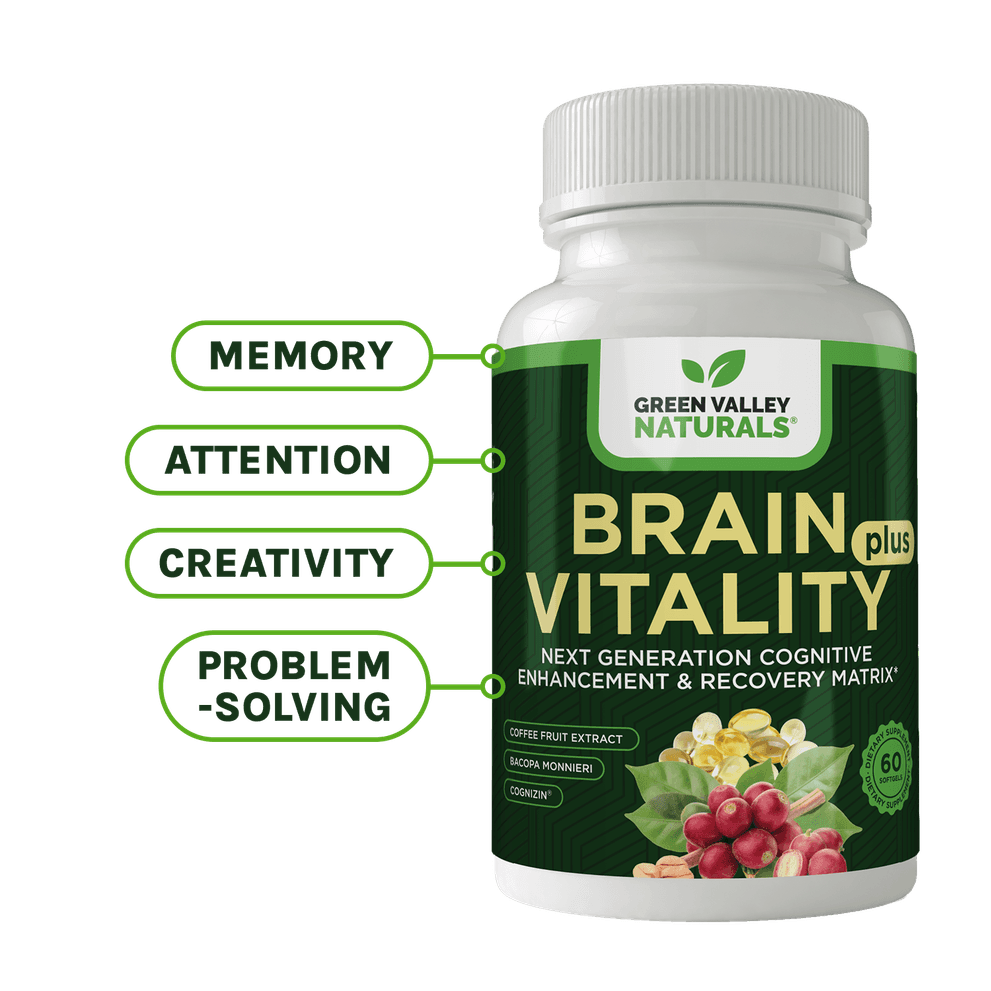
You beat the virus, but what if COVID left behind an invisible mark on your brain? Millions are now struggling with an eerie mental haze, such as forgetfulness, confusion, and trouble concentrating, that lingers long after the fever breaks. Doctors call it “brain fog,” but it feels more like your mind just won’t turn on. So what’s really happening inside your head—and can it be reversed? The answers are more surprising and hopeful than you might think.
Key Takeaways
COVID Brain Fog Is Real and Widespread: Long COVID can impair memory, focus, and mental clarity—even in young, otherwise healthy individuals.
Biological Changes Underlie Brain Fog: COVID can inflame the brain, reduce brain volume, and damage neural function—even without directly infecting brain tissue.
There Are Ways to Heal: A combination of brain-friendly foods, sleep, exercise, and targeted supplements (like B vitamins, omega-3s, and curcumin) may support recovery and protect long-term brain health.
The Hidden Impact of COVID on the Brain
Imagine waking up weeks or months after being sick with COVID to find that simple tasks like recalling a familiar name or focusing on a conversation have become incredibly daunting challenges. This unsettling experience has become a common reality for millions after "recovering" from COVID-19. Long COVID is far from being a mere figment of the imagination. COVID brain fog is a genuine condition affecting millions of people worldwide.
A growing body of research shows that COVID-19 should be considered a virus with a substantial impact on the brain. Lifting the fog and helping people live better lives by controlling these cognitive impairments can make a huge quality-of-life and work-productivity difference for millions.
What is COVID-Linked Brain Fog?
Brain fog is a common symptom of long COVID, otherwise called neurologic post-COVID condition (PCC). It affects up to half of patients, according to research published in The New England Journal of Medicine. And some studies report the numbers are as high as eight in 10. In fact, one study in The British Medical Journal reported that 83% of long COVID sufferers self-reported decreased short-term memory and cognitive dysfunction, such as difficulty concentrating or brain fog.
Long COVID is the presence of lingering symptoms more than four weeks (or two months, depending on whom you ask) after recovery from a COVID infection.
Brain fog is a general term used to describe a feeling of being mentally slow, fuzzy, or spacey. It's not just true for those with a serious case of SARS-CoV-2, but also those who have had any COVID infection.
Also, brain fog is not a medical diagnostic term, but summarizes a list of issues with brain function or neurologic symptoms including slow brain processing speed, difficulty thinking, confusion (including while driving), and forgetfulness.
Understanding and addressing COVID-linked brain fog can help you (or a loved one) navigate the long-term effects of the virus and help get your life on track again.
Cognitive Symptoms of COVID-19
COVID-19 cognitive symptoms can include impaired thinking, memory, and focus. COVID can also make pre-existing brain symptoms and conditions worse—including nerve pain and mild memory problems. As well, it can trigger new symptoms, including cognitive impairment, lowered IQ, and small fiber neuropathies.
Perhaps even worse, long COVID brain fog can make you feel like it's all in your head. But in fact, it's a real problem that demands attention and empathy, especially if it fails to resolve in a reasonable time.
Poor memory, fatigue, and other long COVID brain fog symptoms can vary wildly from one person to the next. They can affect anyone who has ever been infected with SARS-CoV-2, even those with mild symptoms, and not just those who ended up in the intensive care unit.
Nor do long COVID brain symptoms affect everyone the same. Some people have different types of health problems or combinations of symptoms. While studies have identified some general trends, scientists don't yet know why some people experience more severe or prolonged brain fog than others.
Long COVID brain fog can make daily tasks feel overwhelming. It can include a host of symptoms including cognitive fog like having trouble finding the right words, slower thinking speed, and difficulty multi-tasking. Or it might be mental fatigue and confusion, struggling with decision-making, trouble following conversations, or feeling mentally drained after simple tasks.
Sometimes it involves emotional and psychological effects such as increased anxiety, depression and mood swings, or sleep disturbances. Some people complain that mental or physical activity can make COVID brain fog worse (called post-exertional malaise, or PEM), or feeling like your brain shuts down after reading, working, or socializing.
Long COVID can definitely have long-term neurological consequences. Studies have shown reduced brain volume, elevated brain injury markers, breaks in the blood-brain barrier and reduced IQ scores... but the long-term implications aren't all fully understood yet.
How COVID Affects the Brain
The brain has a protective barrier called the blood-brain barrier, intended to keep the blood vessels from letting toxins and other harms into the brain. There's evidence that Covid-19 can disrupt the blood-brain barrier, causing it to become "leaky." This promotes brain fog. 7
SARS-CoV-2 infections can trigger brain inflammation even in the absence of the virus being detectable in the brain. 1
Older age males showed a higher viral load and greater symptoms. The older a patient was, the higher the risk of neurological inflammation. 1
Imaging studies done before and after COVID infection show brain volume shrinkage and altered brain structure post-infection. 4 For example, one study revealed an altered structure of the thalamus and basal ganglia during long COVID. 2
Autopsies of patients who had severe COVID but died months later of other causes showed the SARS-CoV-2 virus was still present in the brain tissue. 5
Even when the virus is mild and confined to the lungs, it can still inflame the brain and impair brain cells from regenerating. 6
A different study showed reduced brain activity in another brain region was linked with greater mental fatigue and poor cognitive scores.
Large epidemiological analysis of COVID-19 patients showed increased risk of cognitive problems, such as memory problems. 3
As you can see, COVID-19 can definitely leave its mark on the brain. COVID brain fog is one of the most debilitating problems experienced by people with long COVID symptoms. Additionally, most of the COVID brain fog studies focus on adults. There's much less information on just how COVID-19 affects the brain in children and adolescents.
IQ Changes in the Brain
A new study published in 2024 in the New England Journal of Medicine (NEJM) evaluated nearly 113,000 people who had had COVID-19, either the original strain, the Delta, or the Omicron variant. Those patients had significant deficits in memory and executive tasks.
In that study, patients with mild, resolved COVID-19 showed cognitive decline equivalent to a three-point IQ drop. Patients who had had serious COVID and been admitted to the ICU had a nine-point loss in IQ. Reinfection contributed another two-point drop compared to no reinfection.
The average IQ is around 100. A "highly gifted" IQ level is above 130, while an IQ below 70 shows a level of intellectual disability that typically demands societal support. Putting the NEJM study into perspective, a three-point nosedive in IQ would put an additional 2.8 million people into the below-70 IQ group, needing societal support.
In the same issue of the NEJM, a study of 100,000 Norwegians showed worse memory function at several points up through a 36-month post-acute COVID infection. This problem is just now gaining recognition as a serious risk to brain health, even in mild cases.
Since the beginning of the epidemic, one million American adults have reported having "serious difficulty" remembering, concentrating, or making decisions compared to any time in the previous 15 years. And this statistic was skewed toward younger adults ages 18 to 44.
Diagnosing Brain Fog in COVID-19
Diagnosing COVID-19 brain fog can be challenging because unfortunately, there's no single test that can definitely confirm a diagnosis.
Physicians evaluate patients with long COVID symptoms by using formal cognitive testing, as well as taking a complete medical history, including evaluating for other conditions that can cause brain fog, such as thyroid problems, B vitamin deficiencies, and chronic fatigue disorder. This workup is individualized and considers the patient's symptoms, including memory, attention, and focus problems.
There is a need for a standardized brain fog assessment, which could help physicians objectively measure and quantify brain fog across study platforms.
From Foggy to Focused: How to Heal Your Brain After COVID
Many people experience brain fog from COVID-19 for weeks, months, or even years. Most people get gradual improvement of brain function and its most common symptoms with time. The risk of long COVID is usually higher for those who got severe illness with the acute stage. If that's you, be patient with yourself and avoid frustration, as the brain heals over months, not days.

Managing Brain Fog Symptoms With Lifestyle
There are many ways to support brain health even after severe illness—probably more than you realize.
One way to combat brain fog is to supplement with brain boosting nutrients. Your brain is a huge consumer of energy compared to most other organs. It stands to reason that if you're eating a standard American diet of high-carb junk foods, you're probably leaving your brain at a deficit. More about supplements in a moment.
On a related note, your brain deserves the best foods you can offer it. Long COVID is marked by neuro-inflammation, which affects cognition. Eating whole (real) foods lowers inflammation. Eating sugar is highly inflammatory and leads to more brain fog. Limit caffeine and alcohol, which can over-stimulate or depress the nervous system.
Try to identify where you're struggling. Use self-diagnosis to see where you can do things to take up the slack. This could include scheduling shorter meetings, focusing on one single thing at a time, and using a calendar or technology to stay organized. Pace yourself and avoid over-exertion.
Getting sufficient sleep in a dark cool room is paramount in managing long COVID symptoms, including brain fog. A bad night's sleep is like flying across time zones and is bound to give you brain fog and fuzzy thinking. If you wake up tired all the time, get checked for sleep apnea. Some people had sleep apnea before they got COVID-19. Then getting the illness put them over the top to where it was no longer manageable. Create a sleep routine and avoid blue light screens in the evening.
Exercise is an excellent brain-boosting option. It boosts blood flow to the brain and improves circulation. Include aerobic exercise, strength training, and gentle movements such as walking, stretching, and yoga.
And then there's brain training and cognitive exercises, which can help reactivate neural pathways and help you regain mental sharpness. Try learning a new hobby, language, or skill. Use memory game apps such as Lumosity, Elevate, or Brain HQ to train focus and recall. In addition, journaling and writing can help you organize thoughts and improve word recall.
Emotional factors can trigger or exacerbate other symptoms of brain fog, which may make it harder to manage. Fortunately, you can take certain steps to reduce the emotional and mental health impact. For one thing, minimize stress through relaxation techniques such as deep breathing, yoga, and journaling. Address emotional health including PTSD, anxiety, and depression with friendships, hobbies, exercise, journaling, and art therapy.
Resume your prior activities slowly, especially if you experienced new physical or cognitive symptoms post-COVID. Many long COVID patients experience what's called post-exertional malaise (PEM)—a condition where too much physical or mental activity temporarily worsens symptoms.
Studies show that the COVID vaccine may help reduce long COVID. And treatment with Paxlovid (a prescription antiviral) can greatly reduce the risk of long COVID, including brain fog, when taken within the first five days of the acute infection.

Best Brain Supplements
As for supplements, start with a brain-healthy diet as a base. Salmon, blueberries, broccoli, pumpkin seeds, dark chocolate (in moderation), nuts, eggs, and green tea all contain nutrients that support brain function.
But with long COVID, you may want to supplement too. Supplements such as nootropics can support your brain, reduce inflammation, and boost cognition in various ways. You actually have many options. Some of them have been combined into potent blends for all-in-one-pill convenience. We'll review those at the end.
Foundational Brain Vitamins and Minerals
-
B vitamins—improves nerve function and reduces brain shrinkage. Vitamin B12 (Methylcobalamin) supports nerve generation, brain energy and mental clarity. Folate (natural B9, as opposed to synthetic folic acid) and B6 help lower homocysteine and reduce brain inflammation.
-
Magnesium and zinc—crucial for cognitive function and mental clarity. Magnesium improves memory and learning.
Brain-boosting Anti-inflammatories and Antioxidants
Omega-3 fatty acids—supports brain cell communication.
Sage Leaf—an antioxidant that protects the brain, improves focus and memory.
Coffee fruit extract (Neurofactor)—boosts brain-derived neurotropic factor (BDNF), which builds new neural pathways, helps you learn faster, and increases mental clarity and focus.
Skullcap Extract—calms anxiety, soothes the nervous system, and reduces inflammation.
CoQ10 (Coenzyme Q10)—supports mitochondrial function and brain energy.
Resveratrol—a polyphenol that improves blood flow to the brain and supports mitochondrial health.
N-Acetyl Cysteine (NAC)—a precursor to glutathione, the "master antioxidant," helps detoxify the brain.
Support for Neurotransmitters and Cognition
Phosphatidylserine (PS)—supports brain cell communications and memory.
Acetyl-L-Carnitine (ALCAR)—a modified form of L-Carnitine, designed to cross the blood-brain barrier more effectively and boost mitochondrial function for better mental energy.
Citicoline (CDP-choline) Cognizin—increases acetylcholine, enhancing memory, focus, and attention.
L-Theanine—promotes focus and calm, reduces anxiety.
Bacopa Monnieri—a nootropic herb that boosts memory and cognition.
Support Your Gut-Brain Axis
Probiotics (Lactobacillus and Bifidobacterium strains)—supports gut-brain communication.
Prebiotics (Inulin, FOS, Acacia Fiber)—feeds good gut bacteria for neurotransmitter production.
Omega-3 Fatty Acids (EPA/DHA)—reduces brain inflammation, enhances cognition.
Quercetin—helps regulate immune response and gut health.
Three Brain Support Blends to Consider
If your response to that list is, "Whoa, that's a lot!" we've got you covered. Life may be simpler and easier by taking any or all of these three blended products, so you don't have to spend a few hours getting this all set up every day.
-
Brain Vitality Plus—combines omega-3 fatty acids, citicoline, coffee fruit extract (Neurofactor), Bacopa Monnieri, and two other ingredients. Cognitive enhancement and brain fog recovery matrix, all in just 2 capsules per day.
-
Maximum Memory Support—combines vitamin D3, B6, B9, B12, Phosphatidylserine (PS), and more. Enhances memory, focus, and overall cognition, in just 1 capsule per day.
-
Advanced Brain Power—combines sage leaf, skullcap, resveratrol, and more for excellent brain support, in just 1 capsule per day.
Here are some supplement best practices to consider...
Start with one or two new supplements at a time, to monitor effects.
Choose high-quality brands like Green Valley Naturals that use third-party testing for purity.
Take supplements with food to enhance absorption.
Hydrate and exercise to optimize supplement absorption.
Get lab tested for deficiencies of key nutrients.
When To See a Doctor
Neurological symptoms have been widely observed in COVID-19 patients. Many patients show persistent cognitive impairment. From brain inflammation to onset of dementia in some older patients, COVID-19 leaves a significant mark on the brain, resulting in brain fog and memory problems.
If cognitive symptoms are disabling or persist past six months, see your doctor to discuss development of a care plan. Your healthcare provider should check for nutritional deficiencies, hormone imbalances, test for blood flow and micro-clots, and review your medications for those that affect memory.
Summary
Brain fog is one of the most common and misunderstood symptoms of long COVID, affecting people of all ages—even those with mild infections. Characterized by memory issues, poor concentration, mental fatigue, and slowed thinking, COVID-related brain fog can last for weeks, months, or even years. Studies reveal the virus may trigger brain inflammation, disrupt the blood-brain barrier, and even reduce IQ. Fortunately, lifestyle changes, targeted supplements, and brain-supporting habits may help accelerate recovery and restore cognitive clarity.
Frequently Asked Questions
Does everyone with COVID get brain fog?
Roughly 50% of long COVID patients report persistent cognitive symptoms like brain fog and memory loss, while these issues are rare (under 10%) and much less severe in those who fully recover from infection.
How long does foggy brain last after COVID?
COVID brain fog can last for weeks, months, or even years. Much depends on the individual's body, their lifestyle, diet, exercise, supplement regimen, and numerous other individual factors.
What does brain fog feel like?
Brain fog feels like your brain is foggy, fuzzy, incoherent, and struggling to find the right words, remember things, or quickly assess situations. It can feel like jet lag or severe sleep deprivation. It's not an actual medical diagnosis but a collection of symptoms that many people feel.
What does COVID fatigue feel like?
COVID fatigue feels like extreme tiredness that makes it hard to think, process information, or even live or enjoy daily living. You may feel too tired to get through your day.
How do you get rid of brain fog?
The best approach for getting rid of brain fog is a holistic approach that embraces a healthy diet, exercise, getting adequate sleep, supplementation, stress control, brain exercises, medications, and managing your commitments so you're not overextended. It can help to make notes, a planner, and advocate for yourself.
What vitamin helps brain fog?
There are many vitamins that support the brain and help with brain fog. These include foundational vitamins such as omega-3 fatty acids, vitamin D3, and B vitamins. There are also supplements that support neurotransmitters and cognition such as Phosphatidylserine (PS), and those that support the gut including probiotics and prebiotics.
1 Study Uncovers the Basis of Covid-19 Related Brain Fog. Published August 19, 2024.
3 Long-term Neurologic Outcomes of COVID-19. September 22, 2022. Nature Magazine.
4 SARS-CoV-2 is associated with changes in brain structure in UK Biobank. March 7, 2022. Nature.




